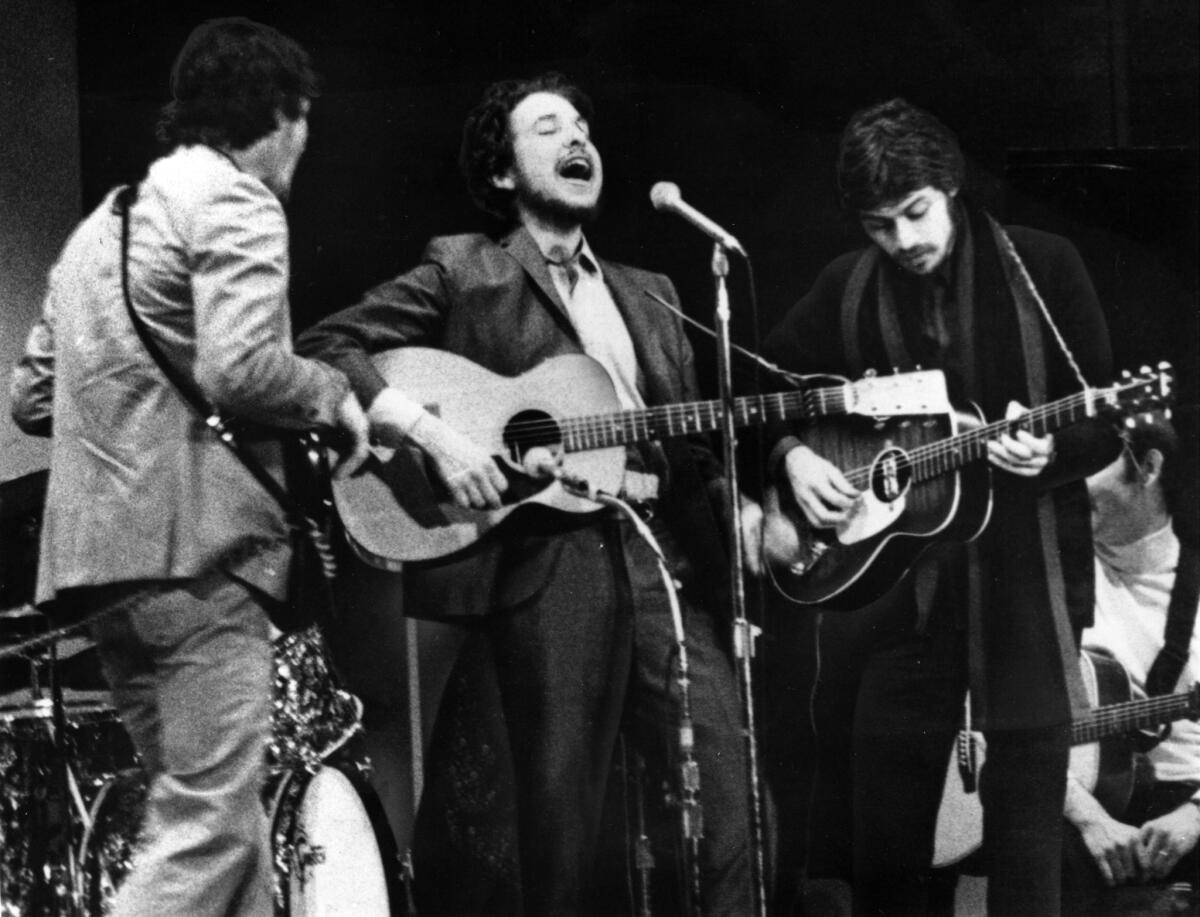Bob Dylan’s ‘Basement Tapes’ release covers multiple formats

- Share via
Sony Legacy appears to be leaving no stone unturned in finally ponying up as much of Bob Dylan’s original “Basement Tapes” material as possible, in a variety of configurations and with much promotional muscle behind it all.
Actor Jeff Bridges narrates a whimsical new video that gives the most general of overviews into the mystique of the “Basement Tapes,” recorded in 1967 while Dylan was recuperating in Upstate New York from a motorcycle accident.
The video uses hyper-speed elapsed video footage of the roughly 110-mile drive north from New York City to the remote wooded town of Saugerties, where Dylan was joined at the house called Big Pink by the musicians who would soon be known on their own as the Band. Together, they worked tirelessly in essentially forging a template for what’s now called Americana music — rootsy sounds with elements of folk, country, gospel, R&B and other strains.
The material is significant both for the breadth of styles as for nascent originals Dylan, co-writing at times with the Band, created during the period, including “I Shall Be Released,” “You Ain’t Goin’ Nowhere,” “Tears of Rage,” “This Wheel’s On Fire” and “Quinn the Eskimo.”
A smattering of those songs, after being widely bootlegged for years, was released in official form by Columbia Records in 1975, but they were augmented both with additional songs from the Band as well as instrumental additions made by Band members Robbie Robertson, Richard Manuel, Rick Danko, Garth Hudson and Levon Helm to make them more presentable for commercial release.
The unexpurgated original recordings, overseen by Hudson and intended only for sharing with publishers to get other artists to record some of the songs, have surfaced in several versions, starting with a two-CD containing 38 tracks (selling on Amazon for $13.99).
Then there’s a vinyl version in which those same 38 tracks are spread across three LPs on heavy vinyl in vintage sleeves, along with 58-page 12x12-inch booklet full of photos from the sessions and essays from roots rock singer-songwriter Sid Griffin (formerly of the L.A.-based ‘80s band the Long Ryders, in recent years playing with London-based Coal Porters), another from Canadian music archivist Jan Haust, who did extensive work do resuscitate the aging tapes Hudson recorded 47 years ago. That set also include the two CDs ($69.99 at Amazon).
The most comprehensive version is “The Basement Tapes Complete: The Bootleg Series, Vol. 11 (Deluxe Edition), a six-CD box set ($82.79, Amazon) containing 138 tracks — every take from the original sessions that was remotely usable. Some are song fragments, most are full performances.
In addition to the CD, mp3, vinyl and video elements, Legacy also has created a limited reel-to-reel tape version containing 11 key tracks from the sessions, packaged in a box replicating one of those Hudson used.
It’s unlikely to spark a widespread open-reel tape revival anything like the vinyl resurgence that’s been growing in recent years, but it figures to be a sought-after item among Dylan collectors, in that a label spokesman said only 100 copies have been made.
As Griffin writes in his main essay, “What is most staggering all these years later is this: with the weight of the popular music world bearing down upon him, a music world he helped shape, Bob Dylan did not become the slightest bit like contemporary music nor did he reflect even a part of it. Nor did he continue on his heretofore successful musical trail.
“Instead, he did almost everything anathema to his peers, he did nearly everything unthinkable to his target audience in his dropping or dismantling so much of what they’d worshiped in him (his marvelously poetic lyrics, his personal stance, his appearance, his thin wild mercury sound). And then he recorded hours and hours of terrific, challenging and new, if surprisingly different, material and released not a minute of it at the time. Which is a stretch even for the unpredictable Bob Dylan.”
The subsequent unauthorized low-fi pirate releases of “Basement Tapes” songs virtually created the modern rock bootleg industry, which leads Griffin to conclude that “Dylan changed the popular music world again. For they came to him, he didn’t go to them. The mountain went to its Mohammed.”
Follow @RandyLewis2 on Twitter for pop music coverage
More to Read
The biggest entertainment stories
Get our big stories about Hollywood, film, television, music, arts, culture and more right in your inbox as soon as they publish.
You may occasionally receive promotional content from the Los Angeles Times.











